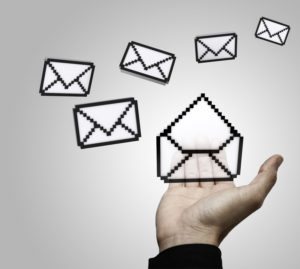Quick links, bringing you great articles on writing from all over the web.
Email lists are marketing gold. Think about it. Someone found what you were saying interesting enough to trust you with their contact information and want to know more. at Jane Friedman talks more about why you should start one, and how. For my paying day job as a software engineer/internet specialist I am quite familiar with the different types of mail services, but right now my favorite is Mailchimp. They are very respectable and work really hard to help beginners and experts alike. Mailchimp stays respectable as they make sure subscribers are not spammed. Because with great power comes great responsibility and no one likes a spammer.
~ * ~
Starting an Email Newsletter: Why to Do It and Which Service to Use
Posted on
 Today’s guest post is the first in a series about growing an email list, by author Kirsten Oliphant (@kikimojo).
Today’s guest post is the first in a series about growing an email list, by author Kirsten Oliphant (@kikimojo).
More and more authors now talk about the importance of growing an email list of readers. But I also hear from many people who are totally frustrated with email, from growing the list size to increasing open rates.
Often people start a list without knowing exactly why or what to do with it. (This is exactly how I started my first list four years ago, by the way.) Email can be your most powerful asset as an author, but you need to be intentional if you want results.
In this series, I’ll walk you through some of the places people get stuck to help you get the most out of your list. To start, let’s take the conversation back a few steps to discuss why email is important.
The Why of Email
With new social media platforms cropping up every month, email seems a little redundant—or even oddly ineffective, since it doesn’t have the same reach; you may have 200 email subscribers and 2,000 Twitter followers. We also know just how crowded our inboxes are. I delete plenty of emails per day without even opening them. So why spend time or money on an email list? Here are a few significant reasons.
Email Is Permanent
Social media is a fantastic tool for authors. We can connect with our readers in ways that were not possible even ten years ago using Twitter or Facebook or Pinterest. The problem is that we don’t control the connections. We are subject to each platform’s changes and algorithms. My Facebook page, for example, typically shows the posts I write to less than 10 percent of my followers.
There is no algorithm on an inbox (usually!). You have access and control that you have on no other platform. You can download a spreadsheet of your email subscribers and their emails at any time. In that sense, you own your list—something you can’t say for your Facebook likes or Twitter follows.
~ * ~
If you liked this article, please share. If you have suggestions for further articles, articles you would like to submit, or just general comments, please contact me at paula@publetariat.com or leave a message below.
